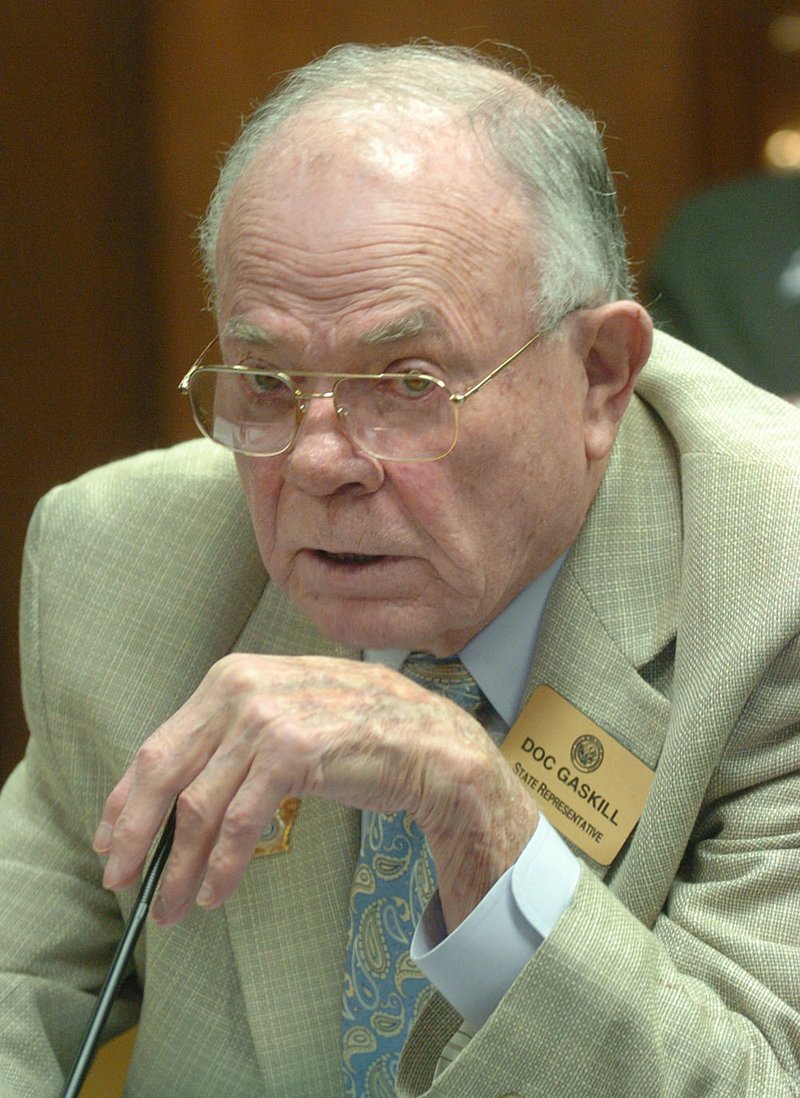LITTLE ROCK — The leaders of the state House of Representatives and the Senate have each filed resolutions aimed at cutting down the number of task forces set up by the Legislature.
In December, legislators balked at a similar plan.
Money collected by legislators from state funds for attending task forces, even ones they aren’t members of, increased significantly in 2010.
Rep. Billy Gaskill, DParagould, collected the most. He received $4,395 in per diem and mileage payments for attending 22 meetings of task forces.
“I’m retired. I have nothing to do,” Gaskill explained earlier this month. “I don’t have a business to operate. When you come down to these meetings, you learn and take something away all the time.”
Overall, legislators received $77,919 for attending task-force meetings in 2010. That’s up from $30,051 in 2009 and $9,517 in 2006, according to the Bureau of Legislative Research.
The Arkansas Democrat-Gazette sorted data from the bureau to determine which legislators received the most task-force money.
House Speaker Robert S. Moore Jr., D-Arkansas City, and Senate President Pro Tempore Paul Bookout, DJonesboro, have each filed resolutions that would encourage legislative committees and subcommittees to handle work that has recently been performed by task forces.
“I’m just saying we need a little more common sense and practicality,” Bookout said.
The resolutions are not binding, which means legislators could adopt the resolutions and then ignore them.
Task forces have no rule making authority. They are made up of legislative and nonlegislative members. They take testimony and can make recommendations to the Legislature to consider.
Bookout said he hasn’t analyzed whether too much legislative per diem has been spent on task forces.
“It’s public money and we need to do it in a responsible way,” Bookout said. “If [the resolutions] lessen the money spent on that, the better.”
Moore said he’s drafted a letter he plans to send to House members, reminding them that if they attend taskforce and committee meetings in the interim - meaning between legislative sessions - that they do so only to gain more knowledge and understanding of state policy.
He said there is no way to police that.
“We have to appeal to the honor in each one of us,” Moore said.
He said he drafted the letter because the issue has been raised in the news media and elsewhere. He said it’s a good time to restate the need for legislators to pay attention to state business when they attend meetings and not attend for another reason, such as collecting per diem.
Moore said he’s seen legislators attend meetings only briefly but doesn’t know whether they didn’t stay because of a prior commitment or because they were only trying to collect per diem.
“I’m not sitting in judgment,” he said.
Gaskill, a former dentist, said it’s good for him to attend meetings even if he’s not a member.
“We’re term-limited so I try to learn as much as I possibly can,” Gaskill said. “When they have a meeting, they want people to attend it. When I learn, I take that home.”
Asked for an example of something he’s learned from a task-force meeting that he’s taken home, Gaskill said he couldn’t think of anything.
“If they have a meeting, I’m going to attend it,” he said. “That’s what they pay me for.”
The number of task forces has increased to 22, up from five in 2003.
Legislators attending task-force meetings may receive $149 per diem payments per day (meant to cover food and lodging) if they live outside a 50-mile radius from the Capitol. They also are paid 51 cents a mile (nine cents more than the 42 cents that other state employees receive).
These amounts for legislators are the maximum amounts allowed by the Internal Revenue Service that can be considered nontaxable expense reimbursements.
Since 2003, the Legislature has created task forces on abused and neglected children; water quality; sickle-cell disease; racial profiling; sustainable building design; water-source protection; athletic trainers; autism; qualifications of chiefs of police; cyber-infrastructure; and the homeless.
Rep. Butch Wilkins, DBono, is the co-chairman of a task force on Alzheimer’s disease. He received the fourth-most for attending task-force meetings in 2010: $2,837 for 15 meetings.
“This task force worked hard and accomplished some things,” Wilkins said. “It was a very dedicated, very hardworking task force.”
The Alzheimer’s taskforce held a news conference Thursday announcing its recommendations, and Wilkins has said he’ll sponsor legislation to try to enact some of those ideas. He said he wants the task force to continue.
Wilkins said “there were a few” legislators who would come to the Alzheimer’s meetings and stay for only a few minutes, but that was the exception.
“Most of them would come and stay,” Wilkins said. “Some would come for a while and leave. We had some there that were very interested and stayed for the entire meeting.”
A more-restrictive proposal on task forces went nowhere when presented in December to the Legislative Council, which is made up of legislators.
It would have required legislators wanting to set up task forces to f ile a statement estimating the cost of the task force and would have abolished all existing task forces by Jan. 1, 2012.
Bookout said he’s not advocating ending all task forces. He said there may be instances when they are warranted. Moore agreed, saying it’s possible the Alzheimer’s task force could continue.
If the Moore and Bookout resolutions pass, Moore said he doubted additional task forces would be created and most existing task forces likely would no longer be used.
Bookout’s proposal, Senate Concurrent Resolution 1, is pending before the Senate State Agencies and Governmental Affairs Committee. Bookout said he’ll bring it up before the committee soon.
Moore’s proposal, House Concurrent Resolution 1003, passed the House on Thursday and is pending before the Senate.
Front Section, Pages 15 on 01/30/2011

